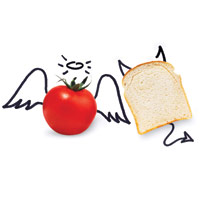A good diet should have strong boundaries, lots of flexibility and as little rules as possible.
Most diets have an abundance of rules, little to no flexibility and non-existent boundaries.
By nature we know no limits, but without limits we are left to be consumed by our own desires, or I guess more accurately, we will probably consume all of our desires.
(Basically I’m saying without limits we’d all eat a lot.)
The trick (or unfair part) is that our limits or boundaries must be self-created.
In other words our boundaries are a matter of self control – knowing when enough is enough, because in the end you do need to take an active role in your weight loss plan.
With Eat Stop Eat, my goal is to give you permission to decide when enough is enough, and make it easy for you to take an active role in your weight loss by deciding when you wanted to fast.
With the Reverse Taper Diet, I simply want you to know that ‘enough’ changes depending on the amount of body fat you have, the amount of muscle mass you have, and your goals.
Eat less when you are fatter, gradually increase your calories as you get leaner to the point where you are eating the amount of food necessary to maintain your desired level of leanness. In essence I want you to ‘plateau’ at your ideal bodyweight..and then stay there.
It’s not rocket science, but rather a clear understanding of the changing boundaries of weight loss. Within those boundaries, I really don’t care if your breakfast is scrambled egg whites with organic spinach and rice milk, or hot chocolate, some bread and a piece of fruit. The flexibility to decide what you want is yours, just to try to keep your decisions within the boundaries that best serve your goals.
Forget trying to attain the ‘perfect balance’ of health and fitness, instead aim for the balance that works.
Eat the foods you enjoy while you are trying to lose weight. And, if you read this as ‘eat cupcakes all day’ then you are sadly missing out on the abundance of amazing tasting foods at our disposal.
Brad



New Comments